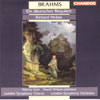Brahms German Requiem
View record and artist detailsRecord and Artist Details
Composer or Director: Johannes Brahms
Label: Classic
Magazine Review Date: 1/1992
Media Format: CD or Download
Media Runtime: 73
Catalogue Number: 98 966

Tracks:
| Composition | Artist Credit |
|---|---|
| (Ein) Deutsches Requiem, 'German Requiem' |
Johannes Brahms, Composer
Donna Brown, Soprano Gilles Cachemaille, Baritone Helmuth Rilling, Conductor Johannes Brahms, Composer Stuttgart Bach Collegium Stuttgart Gächinger Kantorei |
Composer or Director: Johannes Brahms
Genre:
Vocal
Label: Chandos
Magazine Review Date: 1/1992
Media Format: CD or Download
Media Runtime: 74
Mastering:
Stereo
DDD
Catalogue Number: CHAN8942

Tracks:
| Composition | Artist Credit |
|---|---|
| (Ein) Deutsches Requiem, 'German Requiem' |
Johannes Brahms, Composer
David Wilson-Johnson, Baritone Felicity Lott, Soprano Johannes Brahms, Composer London Symphony Chorus (amateur) London Symphony Orchestra Richard Hickox, Conductor |
Composer or Director: Johannes Brahms
Label: Chandos
Magazine Review Date: 1/1992
Media Format: Cassette
Media Runtime: 0
Mastering:
Stereo
DDD
Catalogue Number: ABTD1538

Tracks:
| Composition | Artist Credit |
|---|---|
| (Ein) Deutsches Requiem, 'German Requiem' |
Johannes Brahms, Composer
David Wilson-Johnson, Baritone Felicity Lott, Soprano Johannes Brahms, Composer London Symphony Chorus (amateur) London Symphony Orchestra Richard Hickox, Conductor |
Author:
Gardiner's Philips recording of this work did not win quite the universal acclaim of his 1991
Rilling cares for it a great deal, perhaps making his care too obvious. In the opening bars, for instance, he very carefully 'breathes' at the end of each phrase, and throughout he is likely to care for a cadence or a bridge-passage with a generously spread
Hickox gives a remarkably satisfying performance. Again, take the opening bars as an instance: he is not insistent on the 'punctuation' (which hardly needs help from the conductor) but does observe more meticulously than most the many crescendo-decrescendo marks on individual notes, and brings out the growly counterpoint in the lower strings. His crescendo in ''Denn alles Fleisch'' comes to a great broad climax with the fortissimo entry of the choir (like a procession now coming right up, face to face). In the fugues he secures plenty of rhythmic 'lift' and there is cumulative splendour too. Felicity Lott and David Wilson-Johnson are fine soloists, he singing with more resonance and ease on the high notes than Cachemaille with Rilling. Choir and orchestra are excellent and well-balanced, both in themselves and with each other.
And the third, the inevitable source of comparisons? There were times, while making them, when I warmed to the sheer generosity of style and sound in Hickox and found Gardiner a little too spare in sound-quality, a little too deliberate in style. Yet playing straight through one of the longer movements—the sixth in this instance—one is caught up in the power of it: everything is specific and yet all part of a unified concept: which is not to be missed, even if this new version of Hickox's presents what most of us would still feel to be more Brahmslike Brahms.'
Discover the world's largest classical music catalogue with Presto Music.

Gramophone Digital Club
- Digital Edition
- Digital Archive
- Reviews Database
- Full website access
From £8.75 / month
Subscribe
Gramophone Full Club
- Print Edition
- Digital Edition
- Digital Archive
- Reviews Database
- Full website access
From £11.00 / month
Subscribe
If you are a library, university or other organisation that would be interested in an institutional subscription to Gramophone please click here for further information.





